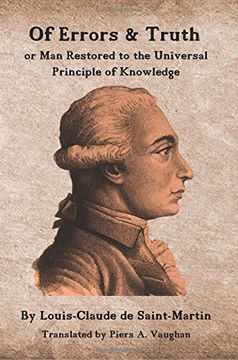Of Errors & Truth: Man Restored to the Universal Principle of Knowledge (en Inglés)
Reseña del libro "Of Errors & Truth: Man Restored to the Universal Principle of Knowledge (en Inglés)"
Of Errors & Of Truth, or Man Restored to the Universal Principle of Knowledge was published in Lyon in 1775, when Louis-Claude de Saint-Martin was 33 years old. Born in 1743 in Amboise, France, he studied Law for a short time before entering the army, serving as a commissioned officer at the Regiment stationed at Foix. There he met the enigmatic Martinez de Pasqually, and shortly thereafter he was initiated into his extraordinary theurgical Masonic group, called the Order of Elect Cohens of the Universe. He soon resigned his commission to become the Master's full-time secretary, eventually reaching the highest Grade in Pasqually's Order, that of Réaux Croix.He worked with Pasqually on his great work, Treatise on the Reintegration of Beings, an extraordinary sprawling work setting forth a unique view on the origin of man, his fall, and providing an unorthodox commentary on the first part of the Old Testament. It is through this close collaboration that Saint-Martin came to meet Jean-Baptiste Willermoz, another disciple of Pasqually who was a prominent Lyonnais businessman and Freemason who went on to found many Masonic Orders, in particular the Scottish Rectified Rite and the Knights Beneficent of the Holy City.However, Saint-Martin became increasingly uncomfortable with the elaborate theurgical rituals of the Elus Cohen, and when Pasqually left France in 1772 to take up an inheritance in St. Domingo, the Order began to fall apart, and Saint-Martin found himself becoming increasingly mystical in outlook.During an extended stay in Lyon with his friend Willermoz, Saint-Martin wrote his first book, under the pseudonym Unknown Philosopher. He was 32 when he wrote it. The book, recollecting Pasqually's Treatise, outlines a mystical philosophical outlook which is clearly based on Pasqually's teachings, but with a distinct Christian flavor. It is wide-reaching, attempting to put forward his theories by drawing on examples from many fields, including Politics, Philosophy, Music, Writing and Painting. The book was printed by Willermoz' fellow Lodge members, the Périsse Brothers, although the frontispeice claims the book was printed in 'Edimbourg', a common practice at the time to avoid paying exhorbitant taxes charged on all books printed in France at that time.The Enlightenment had led to a great expansion in the Sciences, and the search to find the solutions to the great questions in Nature and in Man, rather than in God, distressed him greatly. He was particularly concered about the influence of the so-called Materialists, who he felt were leading mankind on a path toward atheism. Therefore he wrote this book to counter their materialism, and to set forth a sweeping vision of the origin of man, his fall, and the path of return, which, following Pasqually's terminology, he also called the Path of Reintegration.The book was an immediate success, particularly among Masons, though its veiled criticism of religion and politics led to it being put on proscribed lists for a time. Naturally, it drew the wrath of the Enlightenment philosophers of the time, and in particular Voltaire. However, it takes its place as one of the great mystical Christian writings of the 18th Century, and as a major early document on the teachings of European Freemasonry in general, and the nascent Scottish Rite in particular.

